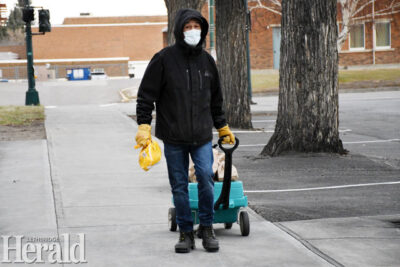A life of experience has Mills helping others amid struggles
By Lethbridge Herald on December 11, 2021.
 Alvin Mills hands out sandwiches to the city’s vulnerable last month. Herald photo by Dale Woodard
Alvin Mills hands out sandwiches to the city’s vulnerable last month. Herald photo by Dale WoodardAl Beeber – Lethbridge Herald
The opioid crisis in Lethbridge is the worst it’s ever been and everyone needs to play a role in solving it, speaker Alvin Mills told the Southern Alberta Council on Public Affairs Thursday.
Mills gave his perspective on the drug crisis and homelessness to SACPA, speaking about his own struggles with addictions and his experiences in residential schools.
Mills told SACPA there are 240 Indigenous people living on the streets of Lethbridge and “they aren’t going anywhere soon.”
Mills, the founder of the Kii Mah Pii Pii Tsin (Kindness to Others) Healing Centre works with addicts on the street, supplying them with sandwiches and donated jackets, trying to help them get their lives back on track.
He would like to open a treatment centre on Blackfoot territory outside of the city, with addicts living in teepees while they get treatment. Away from the city, they wouldn’t have access to the drugs that are causing fatalities every week, he said. He would also like to open a boxing club for younger homeless people so they can get empowerment through sport.
“We need all hands on deck,” said Mills, who is trying to organize a Christmas gift campaign where homeless would get a dinner, a card and a Christmas present and feel special for one holiday season.
“They live a hard life out there,” said Mills, a gifted boxer and basketball player who spent years in residential schools and ended up in prison for attempted murder when he was younger.
“The numbers are getting higher,” he said of addicted and homeless Indigenous people.
The opioid crisis “hit us by storm” in 2012-13, said Mills who was working at the city shelter at the time.
“I’ve lived that life. Now I pass out sandwiches and get donations of jackets,” he said, thanking Lethbridge for the support the city has given his efforts.
People on drugs don’t feel the effect of the elements like they should, he said, with some just wearing hoodies in cold weather.
Mills, one of two remaining out of a family of six children, spoke about the regimented life in the two residential schools he attended – St. Paul’s and St. Mary’s – and how younger students had to face bullying by older ones.
“We were at the mercy of older boys. Violence was always present,” the 60-year-old Mills recalled.
A boxing club started at St. Paul’s gave Mills a chance to give life to his athletic talents. He was also a basketball player and earned a scholarship at Medicine Hat where life unravelled for him when he was free of the routine of institutionalized life and discovered alcohol and drugs.
Mills spent 14 years in the residential school system and in the one year he and others attended school in Cardston, he said they were made to feel they were different.
Life in residential school was a lonely existence, he recalled, with students’ lives being totally structured.
Sports was a positive in his life and he would like younger Indigenous to feel that same impact on their lives.
In a perfect world, Mills said, we would be able to undo the past. The world isn’t perfect, however, and instead as he continues life in recovery, he’s trying to help others with addictions.
Follow @albeebHerald on Twitter
21-20




